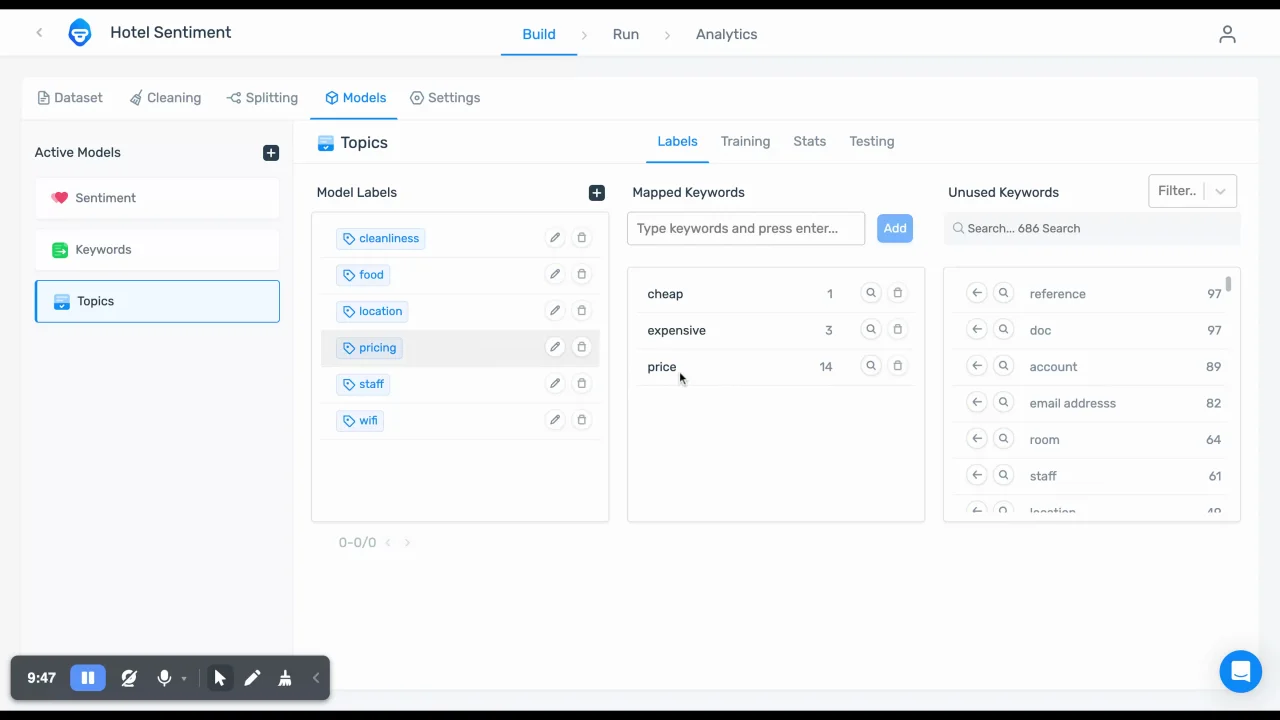
MonkeyLearn: Complete Buyer's Guide
Democratizes machine learning for marketing teams without technical expertise
MonkeyLearn is a no-code text analytics platform that positions itself as the accessible bridge between basic sentiment tools and complex enterprise platforms, enabling marketing analysts to train custom models and extract actionable insights from unstructured text data[42][45].
Market Position & Maturity
Market Standing
MonkeyLearn operates in the competitive text analytics market positioned between basic sentiment tools and enterprise-grade platforms[66][67].
Company Maturity
Established customer base across multiple industries and documented success stories spanning retail, SaaS, and agency environments[40][58][94][95].
Growth Trajectory
Expanding customer base and continued platform development, though specific metrics regarding revenue growth or funding status are not available in current research.
Industry Recognition
Industry recognition appears limited in available research, with customer satisfaction representing the primary validation metric.
Strategic Partnerships
Partnership ecosystem includes integrations with established martech tools like Zapier and Zendesk[81][84].
Longevity Assessment
Strategic uncertainty emerges from reported acquisition developments affecting the vendor's corporate status[43].
Proof of Capabilities
Customer Evidence
Golden Proportions Marketing achieved measurable ROI through call transcription analysis[94][101]. Devex scaled content curation processes with 66% time savings and significant cost reduction[99].
Quantified Outcomes
Consistently show 70-80% reduction in analysis time across customer implementations[109].
Case Study Analysis
Golden Proportions Marketing achieved documented ROI through call transcription analysis[94][101]. Devex achieved 66% time savings in content curation processes[99].
Market Validation
Strong user satisfaction ratings and consistent positive feedback regarding platform accessibility[40][109].
Competitive Wins
Appears in scenarios where organizations need custom categorization beyond basic sentiment analysis but lack resources for enterprise platform implementations.
Reference Customers
Golden Proportions Marketing, Devex, Hotelbeds, Freshly, and Social Status[60][90][94][95][99][101].
AI Technology
Core AI functionality provides sentiment analysis, text classification, and entity extraction through machine learning models that users can customize without coding expertise[42][45].
Architecture
No-code interface architecture represents MonkeyLearn's primary technical differentiator[42][43].
Primary Competitors
Enterprise platforms and specialist solutions[66][67].
Competitive Advantages
No-code interface providing accessibility unavailable in enterprise platforms requiring coding expertise[42][109].
Market Positioning
Focus on accessibility over advanced functionality.
Win/Loss Scenarios
Wins against simpler tools when customization requirements exceed basic functionality and against enterprise platforms when accessibility and implementation speed matter more than comprehensive capabilities.
Key Features

Pros & Cons
Use Cases
Integrations
Pricing
Featured In Articles
Comprehensive analysis of AI Feedback Tools for AI Marketing & Advertising for AI Marketing & Advertising professionals. Expert evaluation of features, pricing, and implementation.
How We Researched This Guide
About This Guide: This comprehensive analysis is based on extensive competitive intelligence and real-world implementation data from leading AI vendors. StayModern updates this guide quarterly to reflect market developments and vendor performance changes.
140+ verified sources per analysis including official documentation, customer reviews, analyst reports, and industry publications.
- • Vendor documentation & whitepapers
- • Customer testimonials & case studies
- • Third-party analyst assessments
- • Industry benchmarking reports
Standardized assessment framework across 8 key dimensions for objective comparison.
- • Technology capabilities & architecture
- • Market position & customer evidence
- • Implementation experience & support
- • Pricing value & competitive position
Research is refreshed every 90 days to capture market changes and new vendor capabilities.
- • New product releases & features
- • Market positioning changes
- • Customer feedback integration
- • Competitive landscape shifts
Every claim is source-linked with direct citations to original materials for verification.
- • Clickable citation links
- • Original source attribution
- • Date stamps for currency
- • Quality score validation
Analysis follows systematic research protocols with consistent evaluation frameworks.
- • Standardized assessment criteria
- • Multi-source verification process
- • Consistent evaluation methodology
- • Quality assurance protocols
Buyer-focused analysis with transparent methodology and factual accuracy commitment.
- • Objective comparative analysis
- • Transparent research methodology
- • Factual accuracy commitment
- • Continuous quality improvement
Quality Commitment: If you find any inaccuracies in our analysis on this page, please contact us at research@staymodern.ai. We're committed to maintaining the highest standards of research integrity and will investigate and correct any issues promptly.